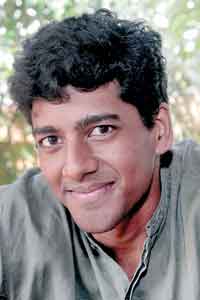Bouquets or brickbats, to keep writing was his aim

Anuk in Colombo last week. Pic by Priyantha Wickramaarachchi
He may have won the 2017 DSC prize for South Asian Literature, but Anuk Arudpragasam seems fairly unfazed by all the fuss. “You can’t take these prizes too seriously because different people read and write for different reasons,” he says, pausing to add that he is appreciative of the recognition and money he received. Another reason he takes his achievement in his stride is because he prefers constructive criticism to praise. “What can you do with praise? It’s embarrassing to listen to sometimes,” he says firmly. He also cites the subject matter of his book as another reason why he doesn’t want to be celebrated too much.
Don’t go asking him for advice on how to write a bestseller either. “I truly believe that the best literature probably doesn’t make it to publication and probably doesn’t get recognition as compared to mediocre literature,” he says, adding that commenting on how to succeed would make it seem as if the system was fair.
His response definitely aligns with Anuk’s personality. The book which won him the prize, ‘The Story of a Brief Marriage’, is his first book which he wrote for himself as a response to his visits to the North after the war. “They were not fact-finding missions; they were more pilgrimages I would say,” he comments thoughtfully – an opportunity for him to take in the landscape, vegetation and just absorb everything about the North. He started writing as a means of processing what he was seeing and a few months later he began to realize that he had lots of material to work with – enough perhaps to write a book. The rest, as they say, is history.
Writing is an important practice for Anuk – so much so that he felt he would continue writing no matter what. “There was a time, just after I finished my novel, that there was a good chance that it wouldn’t be published and that it would be totally ignored and nobody would ever read it,” he says, a thought which had never occurred to him while he was engrossed in writing the book. “And I was forced to think of what writing means to me in my life – was the benefit significant enough that I would continue writing despite not receiving any recognition or support from outside and I realized that I had to keep writing, whatever the outcome,” he says.
An avid reader of publications of foreign writers who don’t write in English, Anuk says that the quality of writing is much better in these books. Some of his favourites and authors include ‘The Rings of Saturn’ by W.G. Sebald (and his other works as well), ‘A book of memories’ by Peter Nadas, and books by Clarice Lispector. “I feel in a sense that out of the world’s major languages the English language is the most banal because it’s the major language and tends to be a little colloquial,” he says.
Anuk plans on donating 1/3 of the money he received to organisations in Sri Lanka, Kashmir and Myanmar, – Kashmir he says because the DSC prize is a South Asian prize, Myanmar because he feels that there are parallels between the situation in Myanmar and Sri Lanka and the organisations from the North of Sri Lanka because that’s the inspiration for his book. He hopes to talk to people who volunteer with such organisations to determine which ones he would like to donate to.
There are many things happening in Anuk’s life at present. At 27, along with finishing his dissertation for his doctorate in philosophy (which he will complete either this year or the next), he is currently working on his second book. But don’t expect to see it in bookshops any time soon – he says, as there’s a long way to go before it’s finished and then he would need to decide if he wants it to be published. All we know for now is that the subject matter of this book is rather different to the previous one. “It starts off in Colombo and moves to the Northeast. The war has a presence but it’s not the subject matter.
He will be moving to India this August “for the indefinite future”, and would be shuttling between India and Sri Lanka the same way he has been moving between Sri Lanka and America, where he is currently studying for his doctorate in philosophy at Colombia University.
India will undoubtedly offer Anuk a chance to perfect his written Tamil, so that he can write more in Tamil. Confessing his desire to enrich the Tamil language – his mother tongue, he says he plans to translate books from English to Tamil, although he hasn’t decided on the books yet. He hopes to live in Jaffna and teach at the Jaffna University eventually, but that won’t be for a long time until he’s settled down. For now, all he knows is that he hopes to work on his projects and go wherever they take him.


